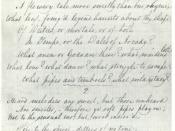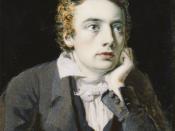John Keats led a short and sorrowful life marked by great anguish, unrequited love, and palpable poetic failure. Nevertheless and perhaps on account of this, he has since become possibly the most remarkable and resounding poet of the Romantic era. The history of Keats's life is often difficult to separate from his poems and correspondences as his personal tragedies echo so loudly from many pieces of his work, but it is this personal drive which led to many of Keats's views and theories on the importance of the imagination and of the individual.
Keats was born in London on October 31st 1795. His father, a livery-stable keeper, died when Keats was eight; six years later his mother died of tuberculosis, the same illness that he would kill his beloved brother Tom and the very same that would eventually destroy him at the tender age of twenty-five. During his lifetime only three volumes of poetry would be published; 'Poems' (1817), 'Endymion' (1818), and 'Lamia, Isabella, The Eve of St Agnes and Other Poems' (1820), none of which were considered to be of any value until after his death.
Reviews of his work were few, often uncomplimentary and many agreed that his work was not of the literary fashion of the time, which in hindsight made his work all the more revolutionary and expressed ideas which had not been considered before him. His musings of the individual led to theories outside the scope of religion and concentrated on the human condition and the romantic idea of the 'soul'.
On April 21 1819 Keats wrote a letter to his brother George and his wife Georgina detailing his thoughts on the process of 'soul-making'. Keats suggested that a human borne to earth as a manifestation of God himself must strive towards the credibility of...



Well done.
Well written essay! Good Job
3 out of 3 people found this comment useful.